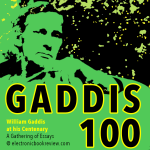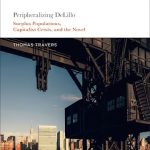fictions present
“A Long and Uninterrupted Decline”: Accumulation, Empire, and Built Environments in William Gaddis’s The Recognitions

Jack Williams, after noting how the "depiction of U.S. imperialism in The Recognitions has received scant critical attention," gathers a selection of concrete descriptions in Gaddis's first novel of the "built environments" in the New York City and Paris sections, then demonstrates how these settings reflect and expand on the novel’s multi-pronged critique of postwar consumer culture.
Vaihinger’s Not So Fleeting Presence: Gaddis, Ballard and DeLillo

Traces of Vaihinger appear in Gaddis’s first novel, The Recognitions. But what of the rest of his corpus? John Soutter explores Vaihinger's influence on Gaddis.
The Specter of Capitalism

In his review of Thomas Travers' book "Peripheralizing DeLillo", Conte explores the thematic undercurrents of capitalism and its discontents across Don DeLillo's oeuvre.
"Trouble with the Connections": J R and the "End of History"

Benjamin Bergholz provides a detailed description of the neoliberal hellscape prophesized in J R. Bergholz identifies a dialectical relationship between our necessary failure as readers to fully comprehend the full details of J R's world, and the historical developments—mainly, the "end of history"—that drive this failure. He asks, how might Gaddis’s decision to impair the reader’s "ability to see what is happening" in the world of his novel help us better engage with "what is happening" in the world outside of it?
New Directions for Gaddis Scholarship

A talk given on October 20th 2022 at the William Gaddis Centenary Conference at Washington University St Louis. The version presented here is the talk as delivered, with minor edits only for clarity on the page and standardized grammar. Steven Moore prefers to leave the talk as a document of its original presentation, rather than changed into an academic article with the attendant scholarly apparatus of footnotes, works cited, and so on.